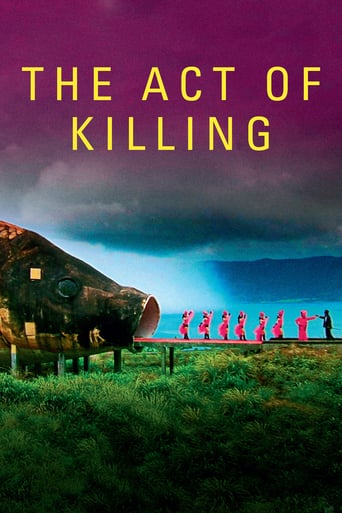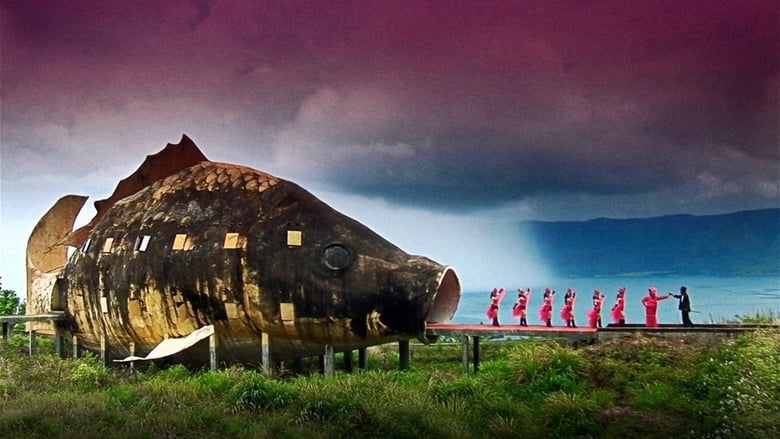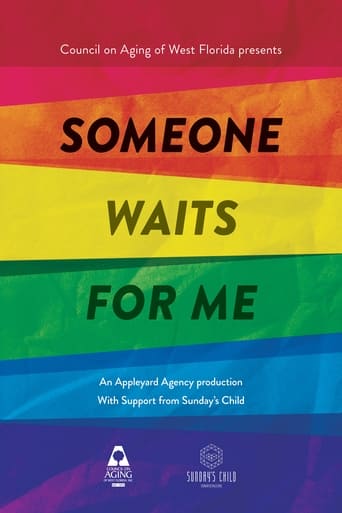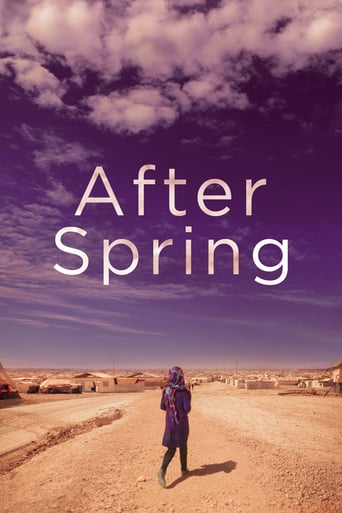The Act of Killing (2013)
Filmmakers expose the horrifying mass executions of accused communists in Indonesia and those who are celebrated in their country for perpetrating the crime.
Watch Trailer
Cast


Similar titles
Reviews
Beautiful, moving film.
I like movies that are aware of what they are selling... without [any] greater aspirations than to make people laugh and that's it.
Exactly the movie you think it is, but not the movie you want it to be.
A clunky actioner with a handful of cool moments.
C.S. Lewis said: "How monotonously alike all the great tyrants and conquerors have been; how gloriously different are the saints." The first part of this quote came to mind while watching this 2012 documentary about mass killings in Indonesia in the 1960's. The director Joshua Oppenheimer used a bold technique to tell the truth about a story for which no one has been held accountable. The Indonesian gangsters killed more than a million supposed Communists, ethnic Chinese, and many others in less than a year and Oppenheimer has the very death squad leaders recount how they did it through reminiscing and acting it out based on the movies they were fans of. They are all more than willing to do so now all these years later and making the movie is matter of pride. They're proud of the cruelty and most of them enjoy acting it out, some of them to continue to keep the accepted narrative going that they are national heroes and others seemingly just for something to do, like now they're movie stars. The main figure, who is a terribly conflicted person named Anwar Congo, tells graphically how he killed people but also about the nightmares he has and seems to have a faint flicker of conscience left. Not pleasant to watch but worth watching for the history as well as what it reveals about evil.
The military dictatorships that seized power in Portugal & Greece in the 1960s seem like boy scout picnics compared to the events that followed the military takeover in Indonesia in 1965. But they had many things in common, the main one being the demonization of communism as a political ideology, and the use of the term "communism" as a label to mark out people for persecution in the post-war years when the interests of the national ruling elites were threatened from below. What this film shows very forcefully is how government propaganda disseminated through the mass information & entertainment media in which "communists" are set up as an existential threat to the nation-state, can take such a strong hold on the minds of certain disenfranchised constituent groups among the lower social orders, young and old, that they think nothing of committing the most horrid crimes & atrocities on their neighbors and even on members of their own families, fully convinced that their actions are justified and sanctioned by the state authorities. I think the film, however, doesn't explore this socio-political angle in sufficient detail. Instead it focuses more on the behavioural aspects of the paramilitary groups and pathopsychological tendencies of their members and sponsors, and their cruel and violent treatment of their "communist" victims. Although this makes for gripping and shocking viewing, with a somewhat surreal and bizarre ambiance, as for example, when the former killers now quibble whether their actions were sadistic, or just plain killing, this approach is also somewhat exploitative of the viewer's emotions, as well as the protagonists' present beliefs and views looking back, which to a large extent are not all that surprising. Moreover there is something uncomfortably voyeuristic about listening to them trying to justify what they did in the past, some trying to suppress remorse through expiatory quasi-religious confession of their crimes, while others come across as completely unrepentant with Nietschian clarity.For me, the key to understanding the political background to the events recounted by the protagonists is the telling assessment by one of them in regard to where their fervent anti-communist beliefs and zealous drive to exterminate communists came from, when he says, "The Americans taught us to hate communists." As a final note, while watching this film I couldn't help but recall reading somewhere that Obama's mother, & perhaps Obama too, was stationed in Indonesia at the time of the military coup. Moreover, throughout the film, I couldn't help but notice the uncanny physical resemblance between Congo and Obama himself. Hmm!
I had been looking forward to this since first hearing about it. The subject would be deep and strange. It had involvement by Herzog in a project that seemed worthy of him. So I made a point to see the authorial version of close to three hours, hoping to land in a broader swim that goes out in search.Kierkegaard said, "life can only be understood backward, but it must be lived forward". He means that life can only be made apparent in reflection but as you live it in the here and now it will be opaque. Conversely however, it means that if we hope to understand history in a significant way, so as to be able to recognize the forces at play in the here and now and not have to wait until later, we should try placing ourselves in it as something that was lived going forward.So by way of history that we can understand backward we learn little here. A military coup in Indonesia resulted in the persecution and death of perhaps up to a million people - that was with Vietnam already underway the same year and driven by the same strategy of containing communism and shady American involvement. But that's another story to tell.So how to begin to make sense in the here and now of a tragedy of unfathomable proportions? The filmmaker could have plainly presented a tapestry of facts and sought historians to explain larger swathes of context. It's not because he thinks the events will be fairly well known that he omits these, rather the whole point here is different.The film is not a historic record that only finds its impetus in the murderers; it's an examination of delusion and ignorance now in this life. Not the fact of murder so much as how individuals carry it with them. They are asked to re enact events, the re enactments played back to them so they're both makers and viewers. How do they see themselves in what they see of themselves? What form does the memory take and what does it mean to live through it after the fact?So these re enactments would be our focal point of entry into the self who lived through them, memory brought alive. Some of them are more fantastical than others. Some are just brutish and senseless, hemmed in by the brutish imagination of their makers. The most chilling thing however is that even the enactments of violent interrogation, in particular those, afford no realer apprehension; they look as banal as movie scenes.Which is to say that there's a certain kind of artifice here that stands in our way and the actual filmmaker can't shed away. Some will say he achieves this in the finale and perhaps he does. But there's another nagging sense for me. See, we follow two or three people, head executioners in their day, picked among dozens of others for the purpose of the film. It quickly becomes obvious why; they're each photogenic in their way, flamboyant and unabashed. It also becomes obvious that they think they're making a different sort of film, one that chronicles their exploits in a favored light. Not surprisingly; they have lived all their life within a state- sponsored narrative that sees events of that day as brave.Now one of them has managed to build around himself something akin to a worldview that lets him escape any guilt. Is any other country innocent of much the same? Another is just a Jack Black looking dufus probably as capable of the same now. But the third one looks like he might be awakening to a more vital realization, the one we would perhaps like him to.See, this is the whole thing. The film becomes about this man making the breakthrough to the kind of story we would like to see told, it's why the climax is reserved for him and not the one who is unrepentant. But this way have we penetrated artifice to get to the real stuff in a deep way? The scene where he retches in the same veranda where he garroted thousands, does it offer the realization we're after?Suddenly it feels as contrived as a dramatized version. See, the whole thing can't be bogged down to whether this man is feeling pangs of regret now, it can't be a concern that he is, unless you're willing to buy the notion that ignorance and delusion have been chased away from him and he's now cleansed. This simply isn't how I'm prepared to leave this behind. Truth, or ecstatic truth like Herzog's kind, is always something you sculpt and this isn't particularly well sculpted truth.What we learn about present day Indonesia was more chilling truth in its way. It becomes obvious that the political caste in power comes from much the same apparatus that exterminated people. A deputy minister openly hailing paramilitaries in a speech while wearing their jacket. A surreal TV talk show that would probably reach tens of millions of homes interviewing the murderers while the whole audience in attendance are paramilitaries. Everything here shows a deeply disturbing mentality that still gleams in the eyes of people.
Some years ago I met a view relatives of victims of the killings in 65 in Indonesia and I was amazed by the fact that so many people never heard of this genocide that took place. Especially here in the Netherlands where we are still talking about the struggle against the Dutch in the 50s while in 65 one of the largest mass murder took place! This film is not just a documentary but it's a very original way of letting the murderers talk about what they did in those years and how they were caught in participating in these horrific killings. It's like if letting old SS men talk about about their acts in the concentration camps without restrictions or condemnations. Mr Oppenheimer made a brilliant live doc through which people can learn what happened in those years and how this affects contemporary Indonesia. Although the movie depicts a heavy subject, it's quite light to watch even funny sometimes and it gives a very realistic idea seen from the eyes of the killers themselves.










